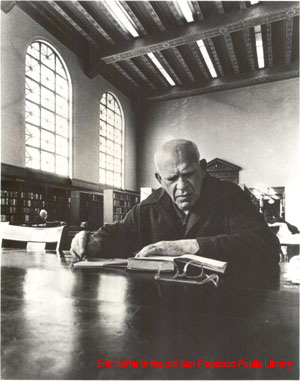
ERIC HOFFER
One of America’s greatest thinkers & philosophers
books available through
Hopewell Publications
read the new biography by Tom Shachtman
American Iconoclast:
The Life and Times of Eric Hoffer
 |
ERIC HOFFER One of America’s greatest thinkers & philosophers books available through read the new biography by Tom Shachtman |
Former migratory worker and longshoreman, Eric Hoffer burst
on the scene in 1951 with his irreplaceable tome, The True Believer,
and assured his place among the most important thinkers of the twentieth
century. His prolific output includes such classics as The Passionate State of Mind, The Ordeal of Change, Reflections
on the Human Condition, The Temper of Our Time, In Our Time, First Things-Last Things, Working and Thinking on the Waterfront, Before the Sabbath, his memoir Truth
Imagined, and the recent collection of his columns The Syndicated News Articles. With more than nine books to his credit, Hoffer remains
a vital figure with his cogent insights to the nature of mass movements and
the essence of humankind. |
Hoffer was awarded the Presidential Medal of Freedom in 1983. Each year Hoffer is memorialized through The Eric Hoffer Award for prose and books. Hoffer's books were edited and restored to print by author Christopher Klim. |
| Books by Eric Hoffer |
It is my impression that no one really likes the new. We are afraid of it. It is not only as Dostoyevsky put it that “taking a new step, uttering a new word is what people fear most.” Even in slight things the experience of the new is rarely without some stirring of foreboding. In the case of drastic change the uneasiness is of course deeper and more lasting. We can never be really prepared for that which is wholly new. We have to adjust ourselves, and every radical adjustment is a crisis in self-esteem: We undergo a test; we have to prove ourselves. It needs inordinate self-confidence to face drastic change without inner trembling. –from The Ordeal of Change |
(ISBN 1933435100, 136 pgs) |
Our age is not the age of the masses but the age of the intellectuals. Everywhere you look you can see intellectuals easing the traditional men of action out of their seats of power. In many parts of the world there are now intellectuals acting as large-scale industrialists, as military leaders, as statesmen and empire builders. By intellectual I mean a literate person who feels himself a member of the educated minority. It is not actual intellectual superiority which makes the intellectual but the feeling of belonging to an intellectual elite. ... –from The Temper of Our Times |
(ISBN 1933435224, 106 pgs) |
|
(ISBN 1933435282, 96 pgs) |
In the alchemy of man’s soul almost all noble attributes—courage, honor, love, hope, faith, duty, loyalty—can be trans-muted into ruthlessness. Compassion alone stands apart from the continuous traffic between good and evil within us. Compassion is the antitoxin of the soul: Where there is com-passion even the most poisonous impulses remain relatively harmless. Thus the survival of the species may well depend on the ability to foster a boundless capacity for compassion.
–from In Our Time |
Nowhere at present is there such a measureless loathing of their country by educated people as in America. An excellent historian thinks Americans are “the most frightening people in the world,” and a foremost philologist sees America as “the most aggressive power in the world, the greatest threat to peace and to international cooperation.” Others call America a “pig heaven,” “a monster with 200 million heads,” “a cancer on the body of mankind.”
–from First Things Last Things |
(ISBN 1933435275, 96 pgs) |
They have been predicting the dire things that would happen to art, literature, and culture in general if the lowbrow masses asserted themselves and imposed their tastes on a society. But could anything equal the inanity and imposture spewed by avant-garde cliques and accepted by self-appointed guardians of our culture? ... Eventually the inanities will be swept away by people of talent who will build the new with a sure hand. My feeling is that when talented people who have something to say use the new techniques their work will be accessible even to the uninitiated. ... How easy it is to forget a mood or perhaps feelings in general. We can remember an act or something we saw, heard, or smelled, but we cannot remember the feelings of happiness, despair, elation, dejection, etc., unless we have encased them in words. .... –from Before the Sabbath |
(ISBN 1933435305, 140 pgs) |
|
(ISBN 1933435011, 120 pgs) |
I was alone in the world, yet not afraid. I was totally ignorant of the mechanics of earning a living and did not worry about what would happen when the three hundred dollars were gone. I rented a cheap room near the Los Angeles Public Library and spent every minute reading. It did not occur to me to explore the city. I lived frugally. When the money was spent I sold my clothes, including a leather jacket, for a pittance and finally faced the mysterious thing called hunger. What happens when one does not eat? I knew that people die of hunger. How long can they go without food? Is death waiting? On the third day of hunger it was as if a hand squeezed and wrung my stomach and pushed it upward against my chest. When I drank water, my scalp tingled as if stung by a swarm of bees. I still had my room and each evening I bathed. There was a feeling of pity for my own body, and I kept it scrupulously clean. I noticed that the hair seemed to grow faster than usual. .... –from Truth Imagined |
website copyright © Hopewell Publications |